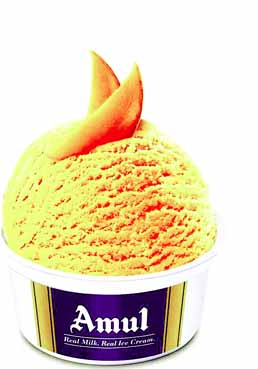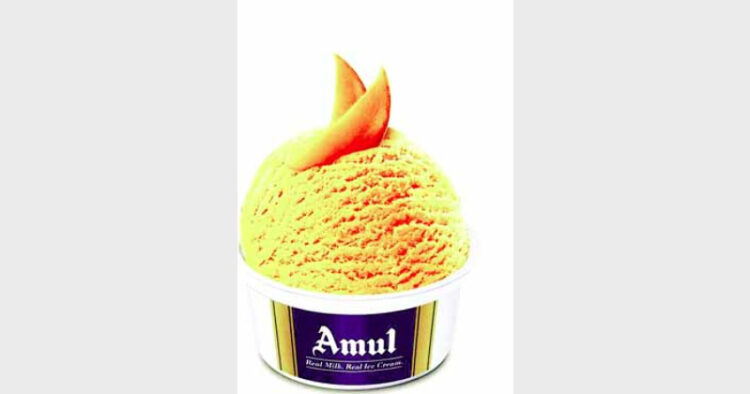 Jaywant Pandya
Jaywant Pandya
The Summer is on in a full swing. Scorching heat makes people sweat. And in this hot climate, it is obvious that people will go for more and more cool food-drink items. When we talk about cool items, first item that comes in mind is ice cream. But wait! What is ice cream? Which item can be called ice cream?
The question arose because there is ‘hot’ war going on between so- called ice cream companies. This war was started by Amul or say Gujarat Milk Marketing Federation Limited (GCMMF). The GCMMF sells its product under Amul brand. Amul ad tells that Amull ice cream is made from ‘real milk’ where as ‘frozen dessert’ is made from vegetable oil. Although ad doesn’t name any brand, it has irked HUL- i.e. Hindustan Unilever Limited and Vadilal dairy international. Both have common interest in this dispute.
The GCMMF says that Amul ad is to make consumers aware about difference between ice cream and frozen desserts. Marketer of ‘Kwality Walls’ HUL says Amul’s ad is misleading.
First of all, why so much hue and cry about frozen food item? How does it matter if you call it ice cream or frozen dessert? people may ask. There is difference. As per Oxford dictionary, definition or meaning ice cream is, ‘A soft, sweet frozen food made with milk and cream and typically flavoured with vanilla or other ingredients’. And what is that you call dessert? As per Oxford dictionary, dessert is ’sweet course eaten at end of a meal’. So difference lies here. If soft sweet food is made from milk, it is called ice cream, but if it is made from vegetable oil, it can’t be called ice cream. It can be classified as frozen dessert. Frozen desserts look and taste like ice cream but they can’t be called ice cream.
Now let’s turn to Food Safety and Standards Authority of India. As per this institute’s regulation 2011 (part 1), the definition of an ice cream, kulfi or softy ice cream is that the product is obtained by freezing a pasteurized mix, prepared from milk and /or other products derived from milk with or without the addition of nutritive sweetening agents, fruit and fruit products, eggs, etc.
Frozen dessert means the product obtained by freezing a pasteurised mix prepared with milk fat and/or edible vegetable oils and fat having a melting point of not more than 37.0 degree C in combination and milk protein alone or in combination/or vegetable protein products singly or in combination with the addition of nutritive sweetening agents.
Health experts say that frozen desserts are harmful as they contain traces of trans fats and saturated fat of 5.8 according to their label. Generally saturated fats are recommended to avoid. American Heart Association believes that our body naturally produces all the LDL cholesterol we need. Eating foods containing saturated fat and trans fat causes our body to produce even more, raising our blood cholesterol level. But a medical website WebMD in its article titled ‘Saturated Fats Not So Bad? Not So Fast, Critics of New Analysis Say’ says that as per Annals of Internal Medicine study, Saturated fats, long thought to raise heart disease risks, had no effect.
Researchers looked at 72 published studies on fats and heart disease. The studies involved more than 60,000 people from 18 countries. But wait! This article is dated 20 th March 2014 where as American Heart Association’s article was reviewed on April 2017.
Now let’s turn to message going viral on social media. Message tells that Amul has won lawsuit against Kwality Walls and some other branded icecream makers. Message also contains a leading newspaper web link. But this news is of year 2012. And news was, Advertising Standards Council Of India, self regulatory body of advertising industry has instructed consumer goods major Hindustan Unilever to stop mentioning its Kwality Walls brand as ‘ice cream’ in certain advertisements following a complaint by top ice cream brand Amul.
But talking legally, game is not over. HUL has filed a case in Mumbai High Court accusing Amul of disparaging frozen desserts and its product Kwality Walls by trying to imply that these are made with vanaspati or hydrogenated vegetable oil. Since Kwality Walls is made from vegetable fats and not hydrogenated oil, and is a market leader in frozen desserts, its product is “disparaged” by Amul ads.
Justice S J Kathawalla suggested changes that could be made in Amul ads so there can be a compromise between two companies. The judge suggested that the makers of Amul ice-cream should change the wording in their TVC’s voiceover. He also suggested to change the way frozen desserts are visually depicted in all their ads from a semi-solid to liquid oil.
The GCMMF’s counsel Ravi Kadam said he would put it to Amul to consider the first suggestion. However, HUL’s counsel Birendra Saraf, raised further objections, saying he would be satisfied after they have a look at the modified ad.
Kadam defended that it was the multinational company’s burden to prove that consumers would be misled by the words “vanaspati tel” in Amul’s advertisements. “The dictionary and Google both show that vegetable oil translates to vanaspati tel”, Kadam argued. “The public understands this equivalent and the dictionary shows what the public understands. The burden of proof is on HUL to show that the public does not understand (this translation).”
But concern is not only limited to health aspect. It involves price too. In a petition filed two years ago on change.org, it is argued that As Desi Ghee (derived from milk) costs about Rs 300/kg, while vegetable oil costs about Rs 80/kg, the retail price of frozen dessert should be much cheaper than ice cream. So, as per this petition Kwality Walls frozen dessert price should be lower than Amul ice cream if Amul’s claim is true, but Kwality Walls price range is almost same as that of Amul.
The Economic Times quoted R S Sodhi, managing director of Gujarat Co-operative Milk Marketing Federation, which owns Amul brand as saying, “Most brands mention frozen desserts in small letters and push the category instead of advertising it as dessert.” He says dairy fat costs Rs 300/kg, while vegetable fat is Rs 50-60/kg. “Frozen desserts play with huge margins and cheat consumers”.
Actually this war is about changing perception also. And this is due to rising market of ice cream and frozen desserts. According to market research company Euromonitor, Bharat’s ice cream market was Rs 8,500 crore in 2015 and it is set to double to Rs 17,000 crore by 2021. Last year it grew up 20 percent. This market has approximately 10,000 players but there are ten major companies vying to occupy top place. They are Amul, Vadilal, Mother Dairy, Cream Bell, HUL, Havmor, Nirula, Arun, Dinshaw and Top ‘N’ Town. Advertisement experts say that there is nothing wrong in Amul ad. Amul ads are quite popular, particularly those ones featuring Amul girl. Hoarding ads have always fun at current affairs. For example, one ad showed young man looking like Rahul Gandhi and it had text- Born in India. Bread in India. Amul – Foren khaao! One ad featured a person looking like than
Minister Shashi Tharoor and said- ECOWNOMISE- Amul for posterity, not austerity. When Anna Hazare’s fast was going on, it showed a girl offering bread-butter to old man looking like Anna. Text said- Khaao na Hazare! Amul Lok priya makhan.
(The writer is a Mumbai-based columnist)














Comments